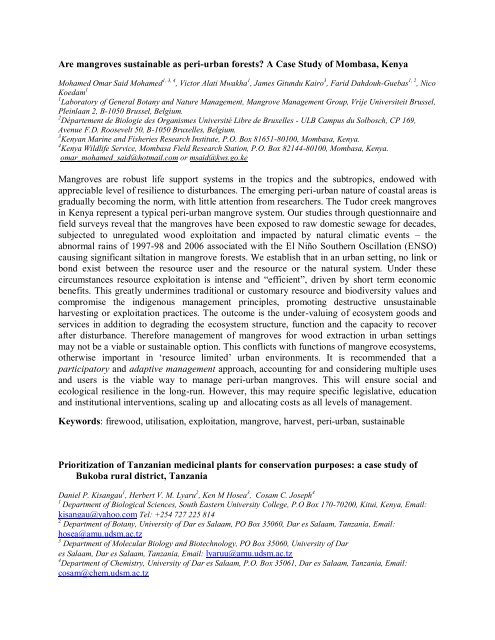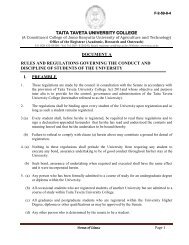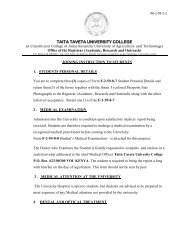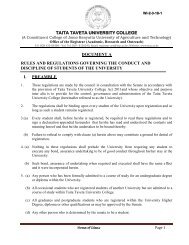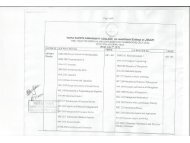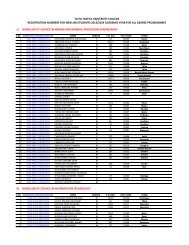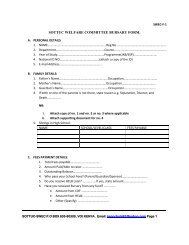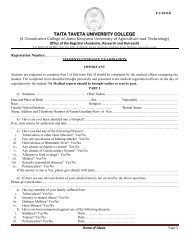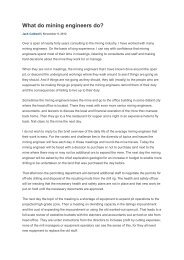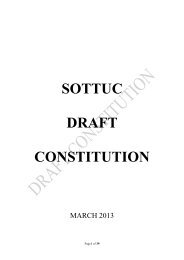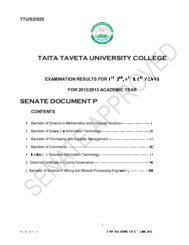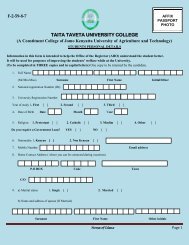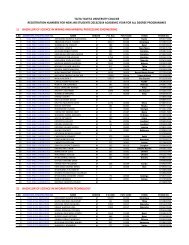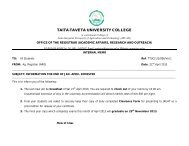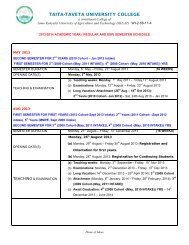Conference Book of Abstracts - Taita Taveta University College
Conference Book of Abstracts - Taita Taveta University College
Conference Book of Abstracts - Taita Taveta University College
- No tags were found...
You also want an ePaper? Increase the reach of your titles
YUMPU automatically turns print PDFs into web optimized ePapers that Google loves.
Are mangroves sustainable as peri-urban forests? A Case Study <strong>of</strong> Mombasa, KenyaMohamed Omar Said Mohamed 1, 3, 4 , Victor Alati Mwakha 1 , James Gitundu Kairo 3 , Farid Dahdouh-Guebas 1, 2 , NicoKoedam 11 Laboratory <strong>of</strong> General Botany and Nature Management, Mangrove Management Group, Vrije Universiteit Brussel,Pleinlaan 2, B-1050 Brussel, Belgium.2 Département de Biologie des Organismes Université Libre de Bruxelles - ULB Campus du Solbosch, CP 169,Avenue F.D. Roosevelt 50, B-1050 Bruxelles, Belgium.3 Kenyan Marine and Fisheries Research Institute, P.O. Box 81651-80100, Mombasa, Kenya.4 Kenya Wildlife Service, Mombasa Field Research Station, P.O. Box 82144-80100, Mombasa, Kenya.omar_mohamed_said@hotmail.com or msaid@kws.go.keMangroves are robust life support systems in the tropics and the subtropics, endowed withappreciable level <strong>of</strong> resilience to disturbances. The emerging peri-urban nature <strong>of</strong> coastal areas isgradually becoming the norm, with little attention from researchers. The Tudor creek mangrovesin Kenya represent a typical peri-urban mangrove system. Our studies through questionnaire andfield surveys reveal that the mangroves have been exposed to raw domestic sewage for decades,subjected to unregulated wood exploitation and impacted by natural climatic events – theabnormal rains <strong>of</strong> 1997-98 and 2006 associated with the El Niño Southern Oscillation (ENSO)causing significant siltation in mangrove forests. We establish that in an urban setting, no link orbond exist between the resource user and the resource or the natural system. Under thesecircumstances resource exploitation is intense and “efficient”, driven by short term economicbenefits. This greatly undermines traditional or customary resource and biodiversity values andcompromise the indigenous management principles, promoting destructive unsustainableharvesting or exploitation practices. The outcome is the under-valuing <strong>of</strong> ecosystem goods andservices in addition to degrading the ecosystem structure, function and the capacity to recoverafter disturbance. Therefore management <strong>of</strong> mangroves for wood extraction in urban settingsmay not be a viable or sustainable option. This conflicts with functions <strong>of</strong> mangrove ecosystems,otherwise important in „resource limited‟ urban environments. It is recommended that aparticipatory and adaptive management approach, accounting for and considering multiple usesand users is the viable way to manage peri-urban mangroves. This will ensure social andecological resilience in the long-run. However, this may require specific legislative, educationand institutional interventions, scaling up and allocating costs as all levels <strong>of</strong> management.Keywords: firewood, utilisation, exploitation, mangrove, harvest, peri-urban, sustainablePrioritization <strong>of</strong> Tanzanian medicinal plants for conservation purposes: a case study <strong>of</strong>Bukoba rural district, TanzaniaDaniel P. Kisangau 1 , Herbert V. M. Lyaru 2 , Ken M Hosea 3 , Cosam C. Joseph 41Department <strong>of</strong> Biological Sciences, South Eastern <strong>University</strong> <strong>College</strong>, P.O Box 170-70200, Kitui, Kenya, Email:kisangau@yahoo.com Tel: +254 727 225 8142 Department <strong>of</strong> Botany, <strong>University</strong> <strong>of</strong> Dar es Salaam, PO Box 35060, Dar es Salaam, Tanzania, Email:hosea@amu.udsm.ac.tz3 Department <strong>of</strong> Molecular Biology and Biotechnology, PO Box 35060, <strong>University</strong> <strong>of</strong> Dares Salaam, Dar es Salaam, Tanzania, Email: lyaruu@amu.udsm.ac.tz4 Department <strong>of</strong> Chemistry, <strong>University</strong> <strong>of</strong> Dar es Salaam, P.O. Box 35061, Dar es Salaam, Tanzania, Email:cosam@chem.udsm.ac.tz


